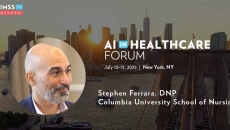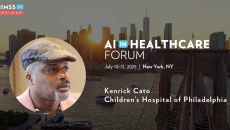Artificial Intelligence
In the discussion of build vs buy, organizations should take advantage of applications by vendors that are ready to go and determine whether they have in-house expertise, says Yesha Patel, data scientist at Keck Medicine of USC.
Efforts to apply agentic or generative AI will fall short without a unified data foundation, report finds.
Key factors are if AI is shown to reduce nursing burnout and educating staff on what the tech can and can't do, says Stephen Ferrara, associate dean of AI at Columbia University and past president of the American Association of Nurse Practitioners.
If leaders are not looking at the whole enterprise, AI projects will fail to be successful, says Dr. Deepti Pandita, CMIO & VP of Clinical Informatics at University of California Irvine Health.
Execs are ready for enterprise scale adoption to embed AI into workflows and demonstrate true ROI, says Carolyn Magill, venture partner at Define Ventures.
Know what journey to pursue, set the ambition, establish ethics and governance, conduct opportunity identification and be clear on objectives and enablements, to harness AI's value, says Children's Hospital of Philadelphia CDAO Dr. Hojjat Salmasian.
Nurses know that if AI is used in the right way to understand patterns, it has positive benefits, says Kenrick Cato, nurse scientist, pediatric data and analytics, Children's Hospital of Philadelphia.
A proposed bill would provide new regulations for how AI is used and reported by insurers, hospitals and clinicians.
Governance is lacking even though 71% of survey respondents have identified and deployed AI solutions.
The biggest challenge is lacking an in-house data and analytics team to build predictive models, so WakeMed Health & Hospitals depends on Epic to make this happen, says Elizabeth Murumalla, the health system's IS project manager.









